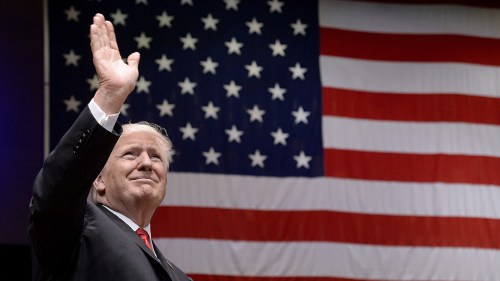Black women motivated to vote this year, say 2024 most important election of their lives: Poll
Black women overwhelmingly believe this year’s election is more important than previous elections, with saving democracy and preserving freedoms as their top issues, according to a new survey.
The Black Women in America national poll, conducted by the Highland Project and Brilliant Corners Research and Strategies, found that 71 percent of Black women voters said this is the most important election of their lifetime. As such, Black women are increasingly motivated to vote this year.
According to the nonpartisan poll, 86 percent of Black women said they will vote this election, an 8 percent increase from last year.
“This is such a pivotal moment in our country,” Gabrielle Wyatt, founder and CEO of the Highland Project, told The Hill. “Black women are truly not just giving their vote, but demanding an actionable agenda that centers our greatest concerns, needs and dreams.”
Broadly speaking, Wyatt added, the data shows a series of top concerns for Black women: protecting and strengthening social safety nets; protecting communities against attacks on rights; reforming the Supreme Court; pursuing gun control to make communities safer; fighting for women’s health, maternal health and reproductive freedoms; creating equitable funding for education; and bringing down costs on everyday goods.
“These issues are very alive and very unwell in Black communities,” said Wyatt. “This is not an election nor a future solely dependent on dollars in pockets. This is a future dependent on how our well-being is protected.”
Racism and discrimination are also top issues for 94 percent of Black women. About 93 percent identified reforming the criminal justice system as another top issue, while 92 percent identified protecting voting rights for all citizens. Meanwhile, 9 in 10 Black women said protecting Social Security and Medicare, fighting inflation and lowering the cost of goods are also top concerns this year.
Cornell Belcher, president of Brilliant Corners, pointed out that concerns about racism and discrimination aren’t new, but the data around these concerns is.
“A decade, decade and a half ago, we did not see this sort of angst in the data about racism and discrimination,” said Belcher, who previously served on the polling team for former President Obama’s election campaigns.
“Since the rise of Trump and Trumpism, African Americans, from a qualitative standpoint, talk about how he’s made it OK to be openly racist,” Belcher continued. “And so when you see this concern, this anxiousness, about racism and the rise of racism and the dangers and the threats that racism has to our communities, I think in many ways, [Vice President Harris] is the perfect antidote to that. Who better understands that and can speak to that and tackle that than Harris, who’s had to navigate that her entire life?”
The survey shows a staggering difference in support for former President Trump and Vice President Harris, who rose to the top of the Democratic ticket after President Biden withdrew from the race and endorsed her.
Black women rated their favorability of Harris at 83 out of 100. They rated Trump a 10.9 out of 100. In contrast, Obama received an 86.7 out of 100, and former first lady Michelle Obama received an 87.9 out of 100.
Some of that favorability for the vice president has to do with how Black women feel she will address issues compared to Trump.
Roughly 92 percent of Black women said Harris would do a better job addressing the Black maternal health crisis, compared to 4 percent who said Trump would do a better job. Meanwhile, 83 percent said the vice president will do better handling crime, compared to 10 percent who said the same of the former president, per the poll.
On handling border security, 71 percent of Black women said Harris would do a better job compared to 10 percent who said Trump would. On immigration, 73 percent said the Democratic nominee will do better than her GOP rival, who garnered 15 percent support, the survey found.
“I think Black women right now are naming that our future is truly at stake, and that this election actually goes far beyond one election,” Wyatt said. “It goes far beyond electoral politics. It’s about being clear that there are significant and life-altering rollbacks that are happening right now, putting our collective future at stake.”
“And I believe what we’re hearing in the data is that Black women are refusing to choose between freedoms and the status quo,” she added.
Still, though Black women appear to have a sense of positivity and motivation going into November, those between the ages of 18 and 49 feel less optimistic about the economy and direction of the country.
Only 19 percent of Black women ages 18-49 say the economy is getting better, while 49 percent say their wages and salary are falling behind the cost of living. About 62 percent of younger Black women also said they are less satisfied with the direction the country is headed compared to 46 percent of those 50 and older.
“Younger voters are not doing as well at this period of time as our parents and grandparents,” Belcher said. “The data does pick up that larger trend of younger voters being more disillusioned about the American dream than the previous generations.”
Wyatt noted that the data points to how leaders, both those in and outside of politics, can speak to and act on what Black women want to see from those in power.
“It’s not just that Black women are the backbone of democracy, but they’re also the background of economic power for uplifting Black communities,” Wyatt continued. “If we are seeing overwhelmingly in our data that fighting racism and discrimination are the top issues for Black women, now is not the time to roll back or divest in diversity, equity and inclusion efforts.”
“Now is not the time to roll back Black entrepreneur weeks that are happening in stores,” she added. “This data is saying that Black women are going to move with their power, not just at the voting booth, but with their pocketbooks.”
The Black Women in America poll surveyed 705 African American women who are registered to vote. The survey was conducted primarily by phone with a supplement of text-to-web interviews from July 28 to Aug. 7, and the margin of error overall is plus or minus 3.7 percentage points at a 95 percent confidence interval.
Copyright 2024 Nexstar Media Inc. All rights reserved. This material may not be published, broadcast, rewritten, or redistributed..













